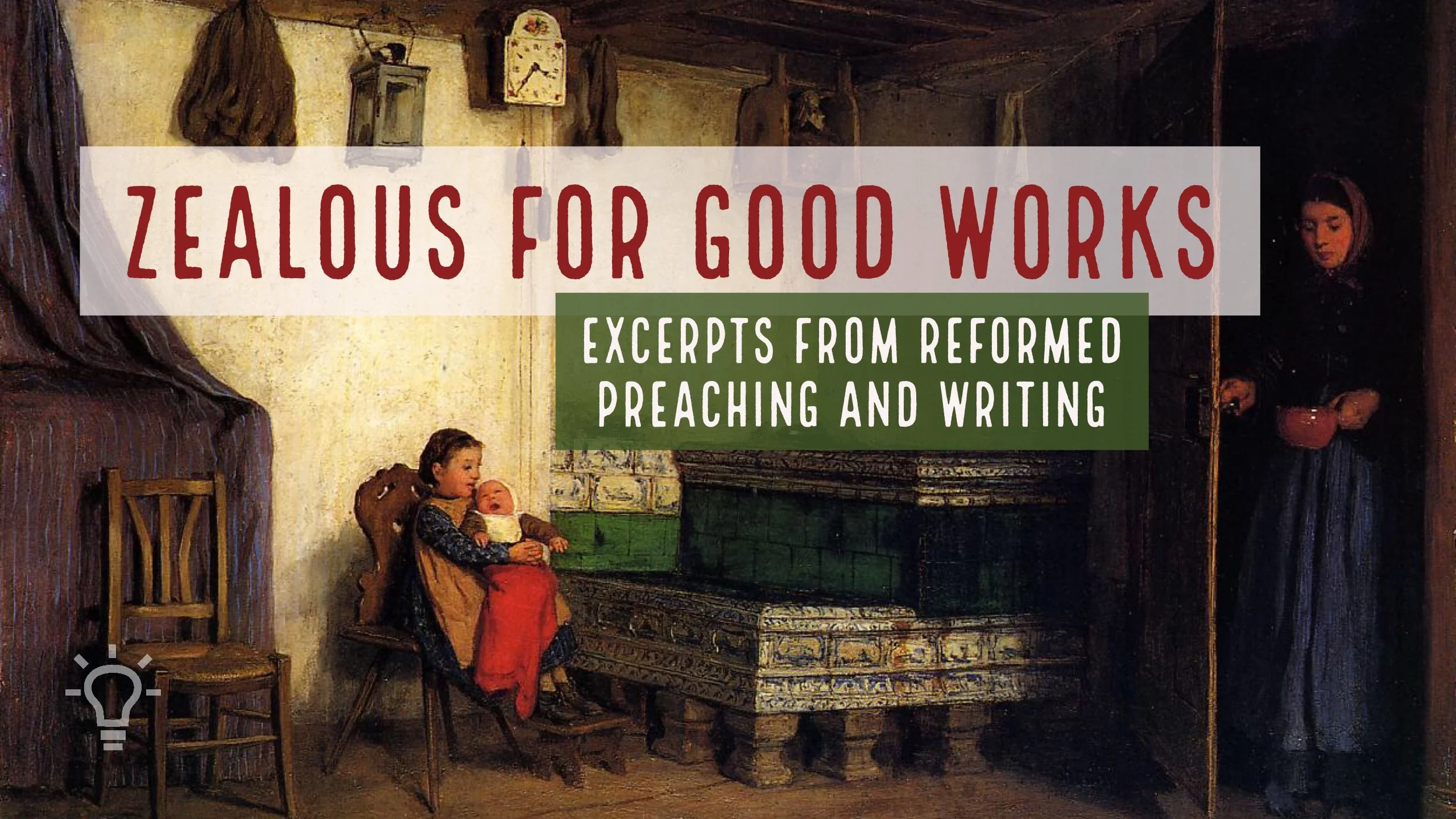Zealous For Good Works: What Are Good Works (part 1)?
Last post I introduced this new series by giving some reasons for studying good works. These reasons boil down to a simple concept: God’s glory and our good. In good works the Christian lives out the glory of God and experiences his pleasure, both now and in the glory that awaits us in Christ. This series will primarily be excerpts from various Reformed sermons and writings with the design to encourage us to be “Zealous For Good Works” (Titus 2:14).
Before we go further it is important that we define exactly what we are talking about when we are talking about good works. First, let’s be clear what we don’t mean:
Good works are not things we do to earn God’s love, deserve his reward, make up for bad things we have done, or merit eternal life. There are several reasons for this which we will see more plainly later in the posts on Reformed preaching and writings on good works, but two are chief among them: We are sinners against a holy God who cannot merely clear the guilty (Exodus 34:7). And second, our deliverance from this quandary is found in the pure, unadulterated mercy of God toward us in Jesus Christ. Nothing may be added or taken away from that truth—having begun in the Spirit we cannot finish by the flesh (Galatians 3:3). From first to last, our deliverance (salvation) from the guilt (justification by faith alone) and power (sanctification by faith working by love) of sin is of undeserved, unearned grace.
We cannot earn it. We cannot deserve it. We cannot work up within us what is needed for these things. The desire, the power, and the will to serve the Lord come from him, and he will get the glory (Philippians 2:12-13). “Cursed,” in fact, “is the one who trusts in man and draws strength from mere flesh and whose heart turns away from God” (Jeremiah 17:5). Even on that day when by grace the Lord receives and rewards our good works, and calls us “good and faithful servants,” we will rightly say, “Lord when did we see you...” (Matthew 25:37) and “We are unworthy servants; we have only done our duty” (Luke 17:10).Good works are not special things we do that are above and beyond the normal call of duty. The religious lost person loves to replace God’s Law with special rules and rites that have the appearance of godliness but in God’s sight are merely prideful replacements for actual good works. “In vain they do worship me, teaching as doctrines the commandments of men” (Matthew 15:9). Yet, they often go to great lengths of labor and sacrifice and bring many others into their false piety: “Woe to you, teachers of the law and Pharisees, you hypocrites! You travel over land and sea to win a single convert, and when you have succeeded, you make them twice as much a son of hell as you are” (Matthew 23:15). Some boast in mighty spiritual-seeming accomplishments: “On that day many will say to me, ‘Lord, Lord, did we not prophesy in your name, and cast out demons in your name, and do many mighty works in your name?’” (Matthew 7:22). Others boast in an asceticism (“Don’t drink, smoke, or chew, or go with girls who do”) or cultural narrowness that really has nothing to do with being godly: “...human precepts and teachings... These have indeed an appearance of wisdom in promoting self-made religion and asceticism and severity to the body, but they are of no value in stopping the indulgence of the flesh” (Colossians 2: 22-23)
Good works are not simply pagan virtues, or the relative goodness of those who try to frame their lives by God’s commands. We all know, either by God’s Word or from nature that God punishes evil (Romans 1:32, 2:2,6,8,9) and rewards righteousness (2:6-7, 10). It is a great mercy that those who do not know and serve Christ are nevertheless not as evil as they could be. In fact, we often see great moral acts among the pagans, and our non-Christian neighbors may have behaviors and attitudes that are comparatively admirable and worthy of our emulation (Matthew 7:11). The mercy of God in retaining within men and nature a revelation of His being and character cannot be overstated (Acts 14:17). Mercy attends all his works (Pslam 145:9), and those without the Law (written) have it still in their consciences (Romans 2:15). But however much a person apart from Christ attempts to frame his life according to that conscience, he will find it both accusing and defending him, as his works cannot even live up to that shadowy and unclear revelation of God’s will (Romans 3:19). That being the case, those with the actual written commands of God are even more accountable and must admit our works are mixed with sin, “As it is written, ‘God’s name is blasphemed among the Gentiles because of you’” (Romans 3:24). Before the holy tribunal of God, the relative goodness of men since the corrupting fall is nothing and simply makes the darkness of our sins more stark: “There is no one righteous, not even one... the Law merely bring awareness of sin” (Romans 3:10,20). Being better than your neighbor is not enough. Relative goodness is not what God has commanded. In fact, “unless your righteousness exceeds that of the Pharisees and teachers of the Law, you will certainly not enter the kingdom of heaven” (Matthew 5:20).
So, if good works are not a way to earn God’s favor, or the extra special efforts of religious zeal, or the relative goodness of being better than others, what are they? We will take up that topic in the next post.

